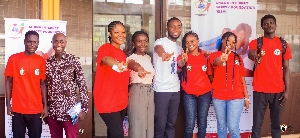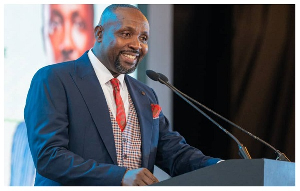The KNUST recently hosted a pivotal discussion on digital well-being, spearheaded by the Ghana Internet Safety Foundation (GISF) and KNUST Peer Counsellors.
This landmark workshop delved into the intricacies of the cyber world, emphasizing resilience and mental health protection while promoting Online Protection and Safe Social Media Practices.
Distinguished speakers enriched the discourse with their expertise:
Dr. Tim McGuinness, a Board Director at SCARS, shed light on online threat dynamics, empowering counselors with insights into predatory behaviors and scam mechanisms.
Dr. Tim McGuiness further urged that while it's important to investigate suspicious activity, netizens' safety should always be the top priority.
He called for the leveraging of our skills for the good of society than resorting to a life of cybercrime.
He emphasized that staying out of cybercrime remains critical and the best approach so far.
"Leveraging our skills for the betterment of society is not only morally upright but also incredibly rewarding.
There are countless ways to contribute positively, whether through volunteering, working in ethical technology, advocating for social causes, or even mentoring others.
Choosing a path that aligns with our values and benefits society can lead to a fulfilling and purposeful life."
He shared some useful tips including the following:
"Tracing suspicious scams requires caution and expertise to avoid personal risk.
It is important to document everything and Keep records of all communication, including emails, texts, and phone calls, as well as any relevant websites or social media profiles.
....Make efforts to verify sources and research the company or individual involved. Also look for reviews, complaints, and any history of scams associated with them.
Look out for Official Websites. If the scam involves a government agency or organization, verify their contact information and reach out directly through official channels.
Contact relevant authorities such as the Federal Trade Commission (FTC), Internet Crime Complaint Center (IC3), or your local law enforcement agency to report the scam.
Trust your instincts and be wary of unsolicited offers, requests for personal information, and high-pressure tactics."
On his part, Dr. Samuel Tinagyei, a cyber-trauma specialist from GISF, highlighted the psychological impacts of cyber threats and advocated for integrating mental health support into cyber safety protocols.
Also, Daniel Ofori of the Cyber Crime Unit, Ghana Police Service, provided practical guidance on reporting cyber incidents and navigating legal procedures.
Gabriel Ofori Appiah, the director of GISF, emphasized the importance of digital literacy and respectful online conduct in creating inclusive and safe digital communities.
Emmanuel Adinkrah, President of GISF, introduced the innovative Cyber Clinic Helpline App, designed to offer swift reporting of harmful online content and access to mental health professionals.
Closing the workshop, Mr. Francis Anarfo, President of KNUST Peer Counsellors, expressed commitment to disseminating digital safety awareness. Mr. Cosmos Osei Kyere, KNUST Counselor and KPC coordinator, stressed the need for resources to support youth mental health.
The event concluded with renewed dedication among peer counselors to champion cyber safety and mental health. Equipped with knowledge and tools, they aim to foster a cyber-aware and psychologically empowered student body.
Key Takeaways for KNUST Peer Counsellors:
Understanding Cyber Threats: Knowledge of cybercriminal tactics is crucial for prevention and response.
Emotional Resilience: Strategies for coping with cyber incidents are vital for maintaining mental well-being.
Legal Awareness: Understanding legal avenues and collaborating with law enforcement are essential in addressing cyber incidents.
Advocacy for Safe Digital Spaces: Peer counselors play a pivotal role in cultivating a culture of safety and empathy online.
Collective Responsibility: Collaboration is key to promoting cyber safety education and practices effectively.
The Ghana Internet Safety Foundation (GISF) has positioned itself at the forefront of the battle for a safer internet, emerging as the nation's premier non-governmental organization devoted to the crucial cause of online safety. With a laser-focused commitment to protecting children in the digital space, GISF pioneers research and spearheads advocacy efforts to promote digital well-being for all.
Click to view details



General News of Thursday, 1 February 2024
Source: www.ghanaweb.com

















